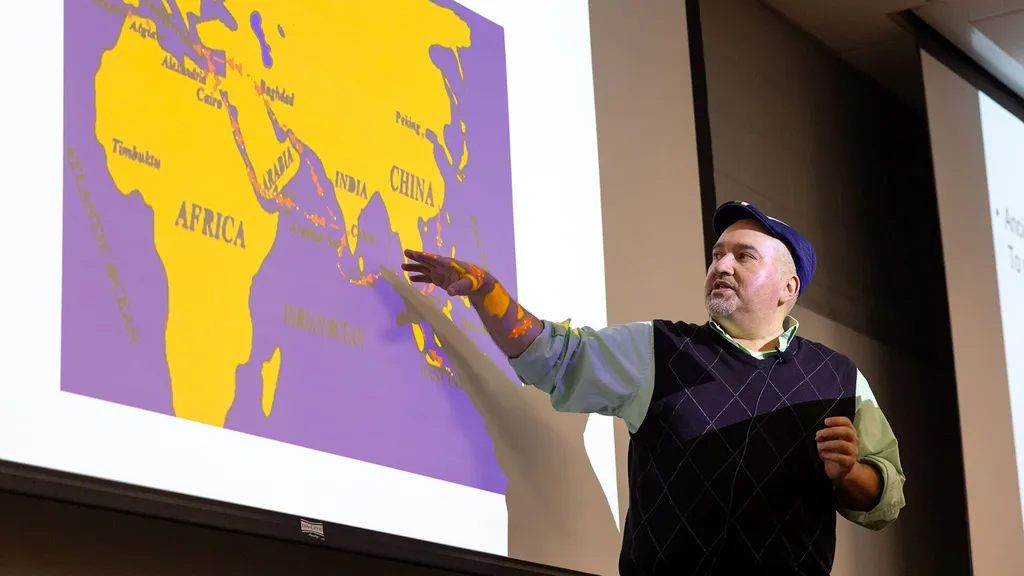- October 20, 2023
- By Maggie Haslam
Herbs and spices can make a Michelin-star marinara or spike a molasses cookie with zesty sass, but as some University of Maryland students are learning this semester, they can also make dishes last longer.
For centuries, the preserving power of oregano, turmeric and other flavor boosters have kept food-borne illness at bay with antimicrobial properties—which is why some of the most flavorful, spice-infused foods are found in the warmest regions of the planet.
It’s just one takeaway from a popular gen-ed course that examines how everyday plants can hurt and heal, compelled explorers to circumnavigate the globe and even incited wars. “Amazing Green: Plants That Transform the World” (BSCI 135) covers the histories, impact and utility of common cultivates and faraway flora, from the medicinal powers of aloe and foxglove to the stimulating origins of tea and chocolate.
“It’s part history, part biology, but really, it’s also exploring how we discovered these usable plants,” said lecturer Edgar Moctezuma (right), a plant biologist who has been teaching a version of the course for the past 11 years. “So much of how our civilization and cultures evolved all started from a humble plant.”

A mix of lecture, discussion and hands-on activities, Moctezuma’s class offers a deep dive on a variety of edible plants, textile plants ornamental plants and cash crops, as well as medicinal plants and their psychoactive counterparts. It’s fun with a stealthy dose of academics: Like a modern-day alchemist hiding vitamins in a fruit-flavored elixir, Moctezuma mixes foundational aspects of biology into the yummy bits that appeal to students—poisonous plants that could kill you, the science of caffeine, and spices that cure disease.
The course covers the history of the plants found in your fridge and fruit bowl—including how humans figured out how they could eat them in the first place—and how they influenced culture and migration; coveted plants have led to wars, colonization and both environmental and human costs. Lab exercises delve into plan structure, genetics and functions, but also cooking with plants, medicinal plants and sustainability.
With their new knowledge, Moctezuma challenges students to debunk myths around diet soda, organic foods and high-fructose corn syrup with investigations that help develop critical thinking skills. While the biology is important, he said, he hopes the course helps students make informed decisions on what they eat, the things they wear, even how they vote. Plants have been beneficial to humans for millennia, Moctezuma tells his students, yet human practices like deforestation threaten not just their ability to grow, survive and thrive, but our own.
“Plants can teach us a lot, they have a head start on us, you know, by millions of years,” he said. “And the more we know about plants and the better we take care of them, the better they take care of us.”
Back in the herbs and spices class, students huddled over paper plates dotted with unlabeled berries, seeds and bark, using the limited kitchen knowledge synonymous with the average college student to try an identify allspice, clove and saffron, plus the spices’ origin and part of the plant.
“Honestly, I don’t think I’ll ever look at food the same,” said Julia Beato, a sophomore business major. “The class looked like fun, which is why I signed up, but so much of what we’re learning applies to real life.”
Take This Class! Is an occasional series that profiles unique and engaging courses available to any undergraduate student at the University of Maryland. Got a class you’d recommend? Email Maggie Haslam at mhaslam@umd.edu.
“Amazing Green: Plants That Transformed the World” (BSCI135)
Satisfies: General education requirements in Distributive Studies: Natural Sciences Lab and Signature Courses: I-Series
Next time you can take it: Spring 2024
A fun fact you’ll learn: Humans are 70% genetically identical to a banana.
Summary: Amazing Green is an engaging way to learn about the science, function and history of the plants we encounter every day.
